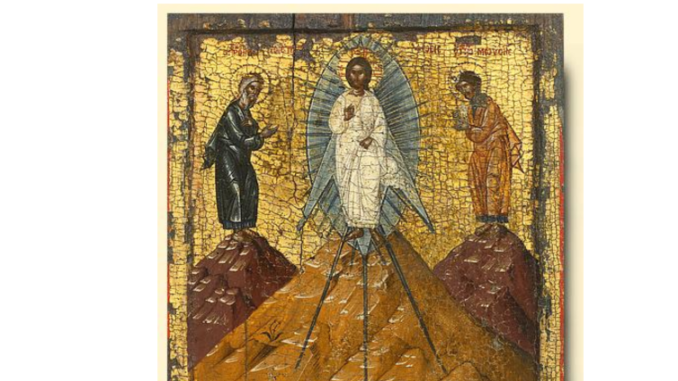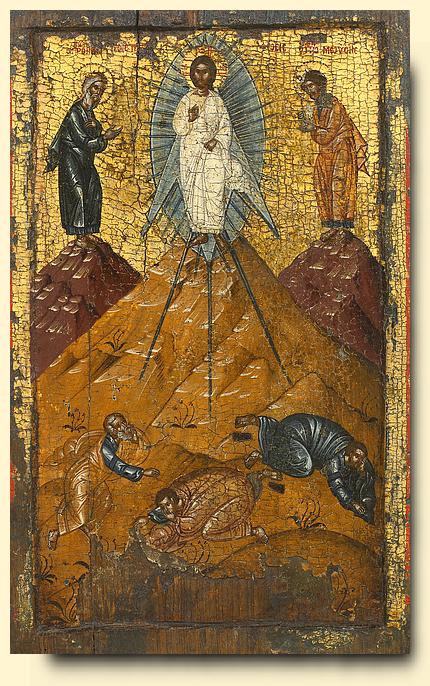
‘Sandalled feet cannot ascend the mountain of God’

Behold! I tell you a mystery. We shall not all sleep, but we shall all be changed, in a moment, in the twinkling of an eye, at the last trumpet. For the trumpet will sound, and the dead will be raised imperishable, and we shall be changed. For this perishable body must put on the imperishable, and this mortal body must put on immortality….
(1 Corinthians 15:51-58)
Like the Incarnation and the Resurrection, the Transfiguration is a Great Mystery. Together, these three make a Trinity of Holy Mysteries which we can only approach barefoot, just as the three disciples did on Mount Tabor.
When I first read the three accounts of the Transfiguration in the Gospels of Matthew, Mark and Luke, a phrase came to mind. It was ‘blinded by the light’. But the three disciples, who accompanied Jesus when he ascended Mount Tabor, when he went up to this high place to pray, were not permanently blinded by the bright light of the Transfiguration.
At first, yes, they were dazzled by it, they fell back, as can be seen in the 16th-century Byzantine icon shown above. Peter, James and John reel backwards down the mountainside, stunned by this shining vision of Divine Light. Peter, on the left, is on his knees praying. With Jesus, they see Moses and Elijah, another Trinity in which the great Law-giver and the holy Prophet meet the Son of God.
You might just be able to see that James (in the centre) loses his sandals as he falls back, for the sacred can only be approached as it were barefoot. As St Gregory of Nyasa, writing in the 4th century, says ‘sandalled feet cannot ascend the mountain of God’. Or, as is said today, ‘You cannot enter heaven with your boots on.’
So the disciples ascended to the ‘high place’ with Jesus to pray; they are barefoot, as we have just heard, but Luke also tells us that: Peter and his companions were weighed down with sleep; but since they had managed to stay awake, they saw his glory and the two men who stood with him…
‘They had stayed awake…’ Does this mean more than simply being physically awake? There are many references in the gospels that stress the importance of staying awake… and how hard it is. We know that, if we are not in the present moment, we miss what is happening in our lives. If we are ‘asleep’, we are likely to miss what is shining brightly right in front of us?
Then a cloud overshadows the three disciples, Matthew describes it as a ‘bright cloud’; they are enveloped in this cloud of glory and the power of the Holy Spirit, a life-force of such magnitude that they are completely overwhelmed, terrified, awe-struck. They hear the voice of God saying: ‘This my Son, my Chosen One’ and, as the cloud of their unknowing clears, they see that Moses and Elijah are no longer there, they are alone with Jesus who touches them and tells them to rise and have no fear.
As they are coming down the mountain, he says to them: ‘Tell no one the vision, until the Son of Man is raised from the dead’. Such a vision cannot be put into words so they keep silent and tell no one about it, but they ponder his words about the Resurrection.
Can we, too, be given a glimpse of the divine? If so, how could we prepare for such a momentous event? First, we must pray and meditate in order to ascend to a higher place within ourselves. We must be attentive, stay awake, not sleep, not be identified with our own egotistical plans and hypnotised by our dreams. We must arrive metaphorically, barefoot, without the baggage of preconceptions.
As TS Eliot says in Four Quartets (Little Gidding):
Quick, here, now, always–
A condition of complete simplicity
(Costing not less than everything)
Or as Thomas Merton, the 20th-century American writer, mystic and Trappist monk, wrote:
‘At the center of our being is a point of nothingness which is untouched by sin and by illusion, a point of pure truth, a point or spark which belongs entirely to God, which is never at our disposal, from which God disposes of our lives, which is inaccessible to the fantasies of our own mind or the brutalities of our own will. This little point of nothingness and of absolute poverty is the pure glory of God in us. It is so to speak His name written in us, as our poverty, as our indigence, as our dependence, as our sonship. It is like a pure diamond, blazing with the invisible light of heaven. It is in everybody, and, if we could see it, we would see these billions of points of light coming together in the face and blaze of a sun that would make all the darkness and cruelty of life vanish completely…’ And he ends: ‘I have no program for this seeing. It is only given. But the gate of heaven is everywhere.’
The Franciscan friar and spiritual writer Richard Rohr puts it clearly when he says: ‘Jesus didn’t come to start another religion but to reveal God’s presence in all of us’.
Lindsay Fulcher